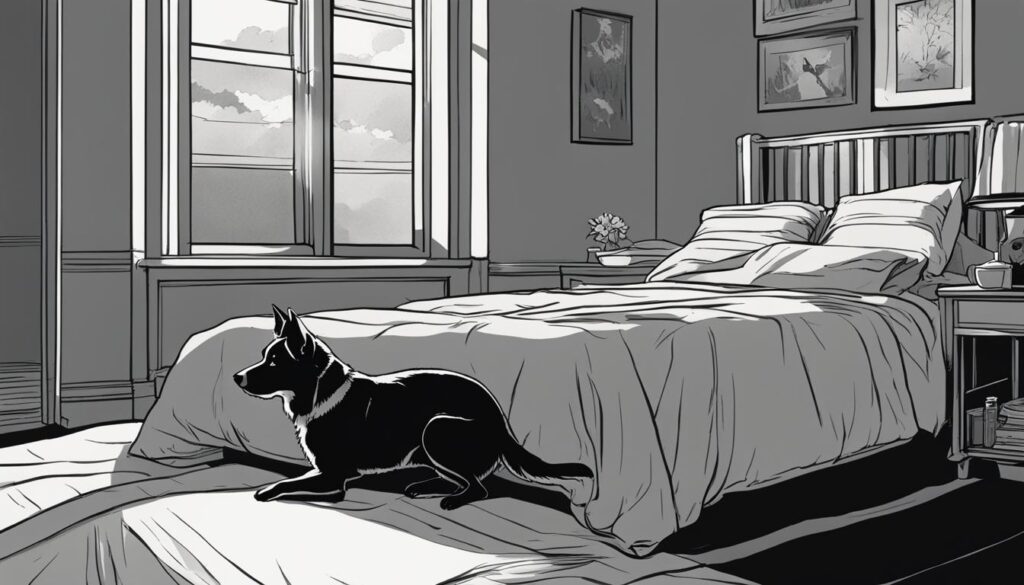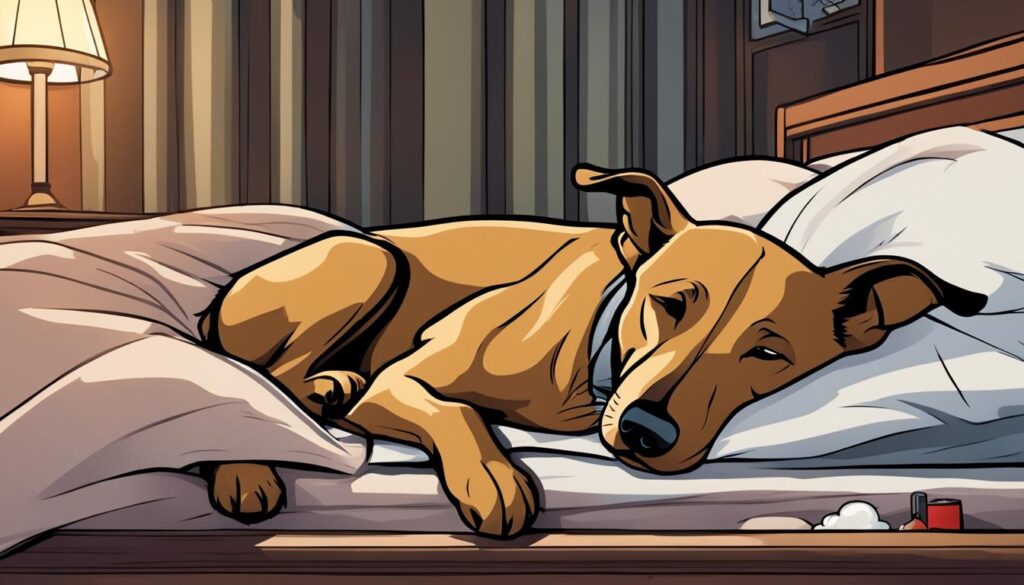Do you dread going to bed because your dog constantly whines and interrupts your sleep? You’re not alone. Nighttime dog whining is a common problem that can leave pet owners feeling frustrated and exhausted. But don’t worry, there are effective techniques and remedies that can help you alleviate this behavior and get both you and your furry companion a peaceful night’s sleep.
In this guide, we will explore the underlying causes of dog whining behavior at night and provide you with practical solutions to help reduce and possibly eliminate the problem. From creating a comfortable sleeping environment to establishing a consistent bedtime routine and addressing anxiety and fear, we’ll cover it all.
Key Takeaways:
- Nighttime dog whining can be a frustrating problem for both pets and their owners.
- There are effective techniques and remedies to alleviate this behavior and improve your sleep quality.
- We will cover techniques such as creating a comfortable sleeping environment, establishing a consistent bedtime routine, addressing anxiety and fear, and training and behavior modification exercises.
- Consistency and patience are key when addressing a whining dog at night.
- With the right approach, you can resolve this issue and enjoy a peaceful night’s sleep with your furry friend.
Understanding Dog Whining Behavior at Night
If you’re wondering why is my dog whining at night, it’s important to understand that whining is a common way for dogs to communicate their needs or emotions. However, excessive dog whining can be a sign of discomfort or anxiety, and it’s crucial to identify the underlying cause to address the behavior effectively.
Some potential reasons for dog whining behavior at night include:
- Anxiety or fear: If your dog is experiencing anxiety or feels fearful, they may whine as a way to communicate their distress. This can be caused by separation anxiety, loud noises, or new environments.
- Physical discomfort: If your dog is in pain or experiencing discomfort, they may whine as a way to alert you to their discomfort. This can be caused by medical issues, uncomfortable sleeping arrangements, or changes in routine.
- Attention-seeking behavior: If your dog has learned that whining leads to attention or rewards, they may continue the behavior even if they don’t have a specific need. This can be caused by inconsistent reinforcement or lack of training.
It’s essential to observe your dog’s behavior and identify any patterns or triggers that may be causing their whining behavior. This will help you develop a targeted approach to addressing the problem.


“Dogs do speak, but only to those who know how to listen.” – Orhan Pamuk
Creating a Comfortable Sleeping Environment
If your dog is whining at night, it may be because they are uncomfortable in their sleeping environment. By creating a comfortable and calming space for your furry friend, you can minimize their nighttime whining and help them get a better night’s rest.
Temperature
The temperature of your dog’s sleeping area can play a significant role in their comfort level. Make sure the room is not too hot or too cold, and consider using a fan or heater to regulate the temperature as needed. You can also try using a heated pet bed during colder months.
Bedding
Provide your dog with comfortable bedding that suits their size and sleeping style. Some dogs prefer more cushioning, while others prefer a firmer surface. You can also add a familiar blanket or toy to help them feel secure in their sleeping area.
Noise Reduction
Excessive noise can be a source of anxiety for dogs at night. If your dog is sensitive to outside sounds or household noises, consider using a white noise machine or soothing music to drown out unwanted sounds.
Feeling Secure
As social animals, dogs often feel more secure when they can sleep near their owners. If your dog prefers to sleep with you, consider placing a dog bed next to your own bed. You can also try using a crate that is large enough for your dog to move around in comfortably, as many dogs find the enclosed space to be calming.


Dog Whining Solutions
By optimizing your dog’s sleeping environment, you can help prevent nighttime whining and ensure a peaceful night’s sleep for both you and your pet. Remember that every dog is unique, so it may take some experimentation to find the most effective solutions for your furry friend.
Establishing a Consistent Bedtime Routine
One of the most effective ways to address a whining dog at night is to create a consistent bedtime routine. This will not only help your dog feel more secure and relaxed at bedtime, but also signal to them that it is time to sleep.
Start by establishing a regular bedtime and stick to it as closely as possible, even on weekends. This will help your dog develop a natural sleep cycle and reduce the likelihood of whining or restlessness at night.
Before bedtime, take your dog for a short walk to help them burn off any excess energy. This can also be a good opportunity for them to use the bathroom and avoid waking you up in the middle of the night.
Once back inside, create a calming environment by dimming the lights and playing soothing music. Consider investing in a comfortable dog bed and placing it in a quiet and secluded area of the house.
If your dog enjoys a bedtime snack, provide it at the same time each night as part of the routine. You could also incorporate some gentle grooming, such as a brush or massage, to help your dog relax and wind down.
Finally, spend some quiet time with your dog before bed, such as cuddling or reading together. This will help strengthen the bond between you and your furry companion, further contributing to a sense of security and calm.


Addressing Anxiety and Fear
One of the main reasons dogs whine at night is anxiety or fear. If your pet is experiencing anxiety, there are techniques and remedies that can help you calm them down and reduce their whining. Here are some dog whining remedies and tips to calm your whining dog at night:
- Desensitization: Gradually expose your dog to the stimuli that cause anxiety or fear. Start with a low level of exposure and increase it gradually over time. This can help your dog become more comfortable with the stimuli and reduce their anxiety.
- Counterconditioning: This technique involves replacing the negative association your dog has with a particular stimulus with a positive one. For example, if your dog is afraid of fireworks, you can play calming music or give them treats during fireworks displays.
- Calming aids: There are various calming aids available, such as pheromones and natural supplements, that can help reduce your dog’s anxiety and whining at night. Consult with your veterinarian to find the best options for your pet.
It is important to remember that addressing anxiety and fear may take time and patience. Be consistent in your approach and seek professional help if needed.
“Dogs have a way of finding the people who need them, and filling an emptiness we didn’t ever know we had.” – Thom Jones


Remember, reducing your dog’s whining behavior at night requires a combination of techniques and remedies. Understanding the root cause of your dog’s whining, creating a comfortable sleeping environment, establishing a consistent bedtime routine, and addressing anxiety and fear are all important steps to achieve a peaceful night’s sleep for both you and your furry companion.
Training and Behavior Modification
Addressing your dog’s whining behavior at night may require training and behavior modification. Here are some techniques you can try:
Positive Reinforcement
Positive reinforcement can be an effective method to encourage your dog to exhibit desired behaviors. When your dog remains quiet at night, praise and reward them with treats or toys. This will reinforce the behavior and encourage them to repeat it.
Teaching Alternative Behaviors
You can also teach your dog alternative behaviors to replace whining at night. For example, you can train them to use a special toy or bed that signals it’s time to sleep. You can also teach them different vocalizations that indicate their needs, such as barks for when they need to go outside.
Seeking Professional Help
If your dog’s whining behavior at night is severe, it may be necessary to seek the help of a professional dog trainer or behaviorist. They can assess your dog’s behavior and provide tailored recommendations and training programs to address the issue.


“Remember that training and behavior modification can take time and patience. Consistency is key, and it’s important to remain calm and positive throughout the process.”
Conclusion
Congratulations on taking the first step towards addressing the issue of a whining dog at night. By implementing the techniques discussed in this guide, you can create a peaceful sleeping environment for both you and your furry friend.
Remember, consistency is key when it comes to addressing this behavior. Be patient and persistent in your efforts, and always approach the situation with empathy and understanding.
Whether your dog’s whining is due to anxiety, discomfort, or attention-seeking behavior, there are steps you can take to stop it from disrupting your sleep. From creating a comfortable sleeping environment to addressing anxiety through training and behavior modification techniques, you have a range of options at your disposal.
By addressing this behavior, you can improve the overall quality of life for both you and your dog. So don’t let a whining dog at night keep you up any longer – take action today and enjoy a peaceful night’s sleep.
FAQ
How can I stop my dog from whining at night?
There are several techniques you can try to address your dog’s whining at night. These include creating a comfortable sleeping environment, establishing a consistent bedtime routine, addressing anxiety and fear, and utilizing training and behavior modification techniques.
Why is my dog whining at night?
Dogs may whine at night for various reasons, including anxiety, discomfort, attention-seeking behavior, or fear. Understanding the root cause of your dog’s whining will help you address the issue effectively.
How can I create a comfortable sleeping environment for my dog?
To create a comfortable sleeping environment for your dog, consider factors such as temperature, bedding, noise reduction, and ensuring your dog feels secure in their sleeping area. These measures can help reduce whining at night.
How do I establish a consistent bedtime routine for my dog?
Consistency is key when it comes to addressing nighttime whining. To establish a consistent bedtime routine, create a calming and predictable routine that includes activities like a bedtime walk, quiet playtime, and providing a comfortable sleeping area.
What can I do to address anxiety and fear-related whining?
If your dog’s whining is related to anxiety and fear, techniques such as desensitization, counterconditioning, and the use of calming aids or pheromones can help. It’s important to consult with a veterinarian or professional dog trainer for personalized guidance.
Can training and behavior modification help reduce my dog’s whining?
Yes, training and behavior modification exercises can be effective in reducing whining behavior. Positive reinforcement, teaching alternative behaviors, and seeking professional help if needed are some techniques you can try.
What are the key takeaways for addressing a whining dog at night?
The key takeaways for addressing a whining dog at night include being patient, consistent, and understanding. By implementing the techniques discussed in this guide, you can help your dog achieve a peaceful night’s sleep and improve your own sleep as well.

